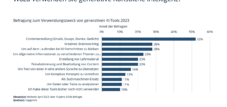Generative AI Optimization (GAIO) – The next generation of search engine optimization – from SEO to NSEO (Next Generation SEO)
Language selection 📢
Published on: October 4, 2024 / Update from: October 4, 2024 - Author: Konrad Wolfenstein

Generative AI Optimization (GAIO) – The next generation of search engine optimization – from SEO to NSEO – Image: Xpert.Digital
🌟🔎 The development of search engines and the creation of GAIO
🌐✨ The world of search engines has evolved significantly in the last few decades. What was once a simple keyword query that displayed results based on a simple match of search terms has evolved into a highly complex system that attempts to understand the context and intent behind a search query. With the rise of artificial intelligence (AI) and the associated generative AI, the next revolution in search engine optimization (SEO) is now imminent: Generative AI Optimization (GAIO). This new form of optimization is changing not only how companies create and optimize their content, but also how search engines themselves present results.
🤖 What is Generative AI Optimization (GAIO)?
Generative AI Optimization is the process of optimizing content to appear in generative AI searches. Generative AI models like GPT can create responses to user queries in a natural, conversational way. This is completely different from traditional search engine results, which typically display lists of web pages that may contain relevant information.
⚙️ The difference between traditional SEO and GAIO
The biggest difference between traditional SEO and GAIO is the way search results are presented. Traditional search engines such as Google typically display a list of websites that the user can browse to find the information they want. These results rely heavily on keywords, backlinks, and other technical SEO factors.
🏢 The role of GAIO in modern companies
GAIO offers an enormous opportunity for companies. As more and more people use generative AI applications to find answers to their questions, it becomes increasingly important to design content so that it can be “read” and consumed by these models. Companies that successfully implement this will be able to significantly increase their visibility and reach.
💼🤖 The importance of GAIO for companies
For companies, GAIO represents a significant change in the way content must be created and optimized. While traditional SEO remains important - especially for ranking in the top search engine results - GAIO offers the opportunity to also be present in the results of generative AI models. This is particularly relevant as users make increasingly complex queries and expect more conversational interactions with search engines.
📈 Steps to integrate GAIO into your SEO strategy
Implementing GAIO into your existing SEO strategy requires a few key adjustments:
1. Focus on context
Traditional SEO revolves around keywords, but GAIO requires a greater focus on context. Your content must aim to answer users’ deeper questions. Imagine what kind of questions a user might ask and try to answer those questions as comprehensively as possible. The goal should be to appear in GAIO queries related to these questions.
2. Currentness of the content
Content that is not updated regularly quickly loses relevance - both in traditional search engines and in generative AI queries. Always keep your content up to date, especially in areas where information changes quickly. This is particularly true in industries such as technology or healthcare, where new information and developments are constantly emerging.
3. Natural language optimization
Generative AI models work best with content written in natural, easy-to-understand language. Avoid overly complex sentences or jargon that cannot be easily interpreted by a model. Instead, try crafting your content to sound like a conversation. This makes it easier for the AI models to integrate your content into a natural response.
✨ Xpert Recommendation: Additional strategies to improve your GAIO
📊 Use of structured data
By implementing structured data (schema markup) on your website, you can make it easier for search engines and AI models to understand the content and context of your pages. This can help your content appear in rich snippets or direct answers.
🗝️ Inclusion of long-tail keywords
Long-tail keywords are longer and more specific search phrases that often have less competition. As users increasingly engage in conversational searches, including these keywords will help you better answer specific questions and increase your visibility.
💬 Encouraging user interactions
Content that encourages interaction, such as: B. Comments, reviews or social media signal relevance and topicality. These signals can influence both traditional search engines and AI models.
🔄🔍 Twin Transformation: Connecting GAIO with Traditional SEO
To realize the full potential of GAIO, companies should combine their traditional SEO efforts with GAIO strategies. Here are some steps for successful integration:
1. Contextualization of the content
Content should be designed to answer specific user questions in context. This requires a thorough analysis of the target audience’s potential questions and concerns.
2. Timeliness of information
Content needs to be updated regularly to ensure it always provides relevant and accurate information. This is particularly important for subject areas that are rapidly evolving or changing.
3. Natural language optimization
Using a natural and conversational style is crucial. Content should be easy to understand and at a readability level that is accessible to a wide audience. A simple test like the Flesch-Kincaid readability test can help ensure that the language is not too complex.
⚙️🌐 Challenges and opportunities
The transition to GAIO brings both challenges and opportunities. On the one hand, companies may need to rethink their existing strategies and develop new capabilities to keep up with the demands of generative AI models. On the other hand, GAIO opens up new opportunities to interact with customers and improve the user experience.
A key advantage of GAIO is its ability to provide personalized and relevant content tailored precisely to the user's needs. This can not only improve visibility in search results, but also increase customer trust and loyalty.
🤖 The role of AI in the future of marketing
As AI technology advances, the way we create and distribute content will also change. Companies must adapt and learn how to use AI to optimize their marketing strategies. This includes not only content customization, but also understanding how AI influences user experience.
🌐 The future of GAIO
While GAIO is still in its infancy, it is already clear that it will transform the way companies create and optimize content. As generative AI becomes more integrated into search engines and other platforms, companies must adapt their strategies to stay relevant. This requires a shift in thinking from mere keyword optimization to a more comprehensive and contextual approach to content creation.
Companies that recognize this change early and adapt their SEO strategies accordingly will gain a significant competitive advantage. Not only will they be better able to show up in generative AI searches, but they will also strengthen their position in traditional search engines.
In a world where artificial intelligence is becoming more and more influential in our daily lives, GAIO will undoubtedly play a central role in the future development of search engines and the digital marketing landscape.
📣 Similar topics
- 📈 Search Engine Development: The Journey to GAIO
- 🤖 Generative AI Optimization: The new era of search engine optimization
- 🧠 From keywords to context: changing search algorithms
- 🔍 RankBrain and BERT: The Semantic Search Revolution
- 🌐 GAIO and the impact of AI on modern businesses
- 🛠️ Steps to implement GAIO in your SEO strategy
- 📅 Why timeliness is crucial for GAIO
- 🗣️ Natural language as the key to GAIO success
- 🚀 The future of search engines: GAIO at the forefront
- 🎯 Competitive advantages through early GAIO adaptation
#️⃣ Hashtags: #Gamification #ArtificialIntelligence #DigitalMarketing #Search Engine Optimization #Content Optimization
Ⓧ 👩🏫 🔍 NSEO (Next-gen Search Engine Optimization) – How AI chatbots, content AI and AI voice engines will transform internet searches

NSEO (Next-gen Search Engine Optimization) with artificial intelligence – AI chatbots – Image: Xpert.Digital
Over the next few years, the way we search for information online and the technologies that support our search will change dramatically. With the rise of artificial intelligence (AI), particularly through AI chatbots such as ChatGPT and Perplexity as well as through AI-supported content generation, companies are facing a fundamental realignment of their digital strategies. These developments bring into play the concept of “Next-gen Search Engine Optimization” (NSEO) – a new era of search engine optimization that will upend traditional models.
More about it here:
We are there for you - advice - planning - implementation - project management
☑️ Industry expert, here with his own Xpert.Digital industry hub with over 2,500 specialist articles
I would be happy to serve as your personal advisor.
You can contact me by filling out the contact form below or simply call me on +49 89 89 674 804 (Munich) .
I'm looking forward to our joint project.
Xpert.Digital - Konrad Wolfenstein
Xpert.Digital is a hub for industry with a focus on digitalization, mechanical engineering, logistics/intralogistics and photovoltaics.
With our 360° business development solution, we support well-known companies from new business to after sales.
Market intelligence, smarketing, marketing automation, content development, PR, mail campaigns, personalized social media and lead nurturing are part of our digital tools.
You can find out more at: www.xpert.digital - www.xpert.solar - www.xpert.plus

























